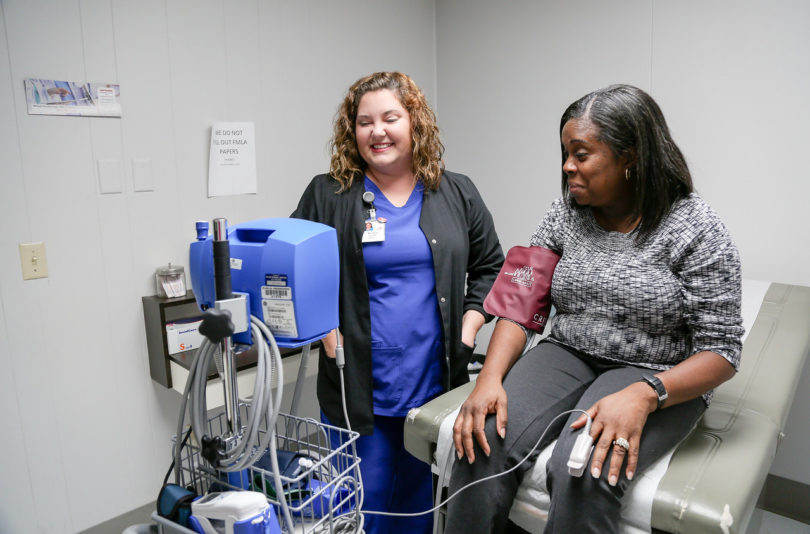For the second year, three University of Georgia programs have been selected as finalists for national awards recognizing innovation in economic development.
Archway Partnership, Carl Vinson Institute of Government and Innovation Gateway are among the 24 finalists for the University Economic Development Association 2018 Awards of Excellence. UGA’s finalists are in different categories and will not compete with one another.
UEDA represents higher education, private sector and community economic development stakeholders across North America. Entries were judged by a panel of university and economic development professionals based on the alignment of their institution’s core mission activities with regional economic development goals. Categories include innovation, talent and place, as well as the intersections of these three categories. Criteria for judging included originality, scalability, sustainability, impact and the feasibility of other organizations replicating the initiatives in their communities.
Two of the finalists are from units of the Office of the Vice President for Public Service and Outreach:
- UGA Archway Partnership Addresses Healthcare Needs in Rural Georgia is a project in which UGA faculty and students worked side-by-side with local stakeholders in Pulaski County to evaluate health data, conduct surveys and host focus groups to prepare the local hospital’s mandated Community Health Needs Assessment. The CHNA assisted the rural hospital in remaining viable in a challenging environment by bringing to light new services that community members would like to see. This collaboration led to the establishment of an urgent care clinic at Taylor Regional Hospital. The clinic is seeing an average of 18 patients a day and has reduced hospital emergency room traffic by 10 percent. The Archway Partnership project is a finalist in the “Place” category.
- The Georgia Certified Economic Developer Program was developed by the Carl Vinson Institute of Government in an effort to be responsive to Georgia’s economic development needs. The state-specific training provides the essential high-quality curriculum needed by economic development professionals to effectively compete in today’s global economy. The program offers economic developers the opportunity to achieve their certification more cost-effectively, as courses are taught in central locations around Georgia, and timely, within a two- to three-year period. The courses offer practical, skills-based training with immediate application. The program design is grounded in a competency cluster framework that reflects internationally recognized skills and abilities. Since the launch in 2016, participants from over half of Georgia’s 159 counties have enrolled in GCED classes. In September 2017, UGA awarded the first GCED designation followed by four additional recipients in May 2018. The GCED program is a finalist in the “Talent + Place” category.
“We are honored to be finalists again in this national competition,” said Jennifer Frum, vice president for public service and outreach. “This recognizes UGA’s commitment to improving the quality of life for all Georgians.”
The third finalist is from the Office of Research:
- The Cultivar Development Research Program is an internal grant program, managed by Innovation Gateway in cooperation with the College of Agricultural and Environmental Sciences and the Georgia Seed Development Commission, that is funded entirely by the licensing royalty revenue derived from UGA-developed plant cultivars (varieties). Since 1997, the CDRP has provided almost $20 million in grant funding that has helped generate more than 300 new plant cultivars. Cultivars generated through CDRP funding have had a tremendous impact on Georgia’s $73 billion agriculture industry, helping Georgia become the No. 1 state for peanut, blueberry and pecan production. Furthermore, the CDRP simultaneously serves as an effective tool in attracting and retaining top-tier plant breeding scientists to UGA. The CDRP is a finalist in the “Innovation” category.
“The beauty of UGA’s Cultivar Development Research Program is that we use licensing revenue from existing cultivars to invest in research that yields the next generation of cultivars, and so it propagates the university’s very positive impact on commercial agriculture,” said Vice President for Research David Lee. “It’s a win-win for everyone and has allowed us to maintain a robust, diverse plant breeding portfolio.”
Winners will be announced during the UEDA Annual Summit in Milwaukee, Wisconsin, Oct. 21-24, 2018.
Two other UGA programs were selected as “Lightning Round” entries, new in 2018. Each entry will be allowed a five-minute pitch to the audience at the UEDA Annual Summit in October, followed by a question and answer period.
UGA’s Lightning Round entries are:
- The Animal Health Hackathon, hosted by UGA and Boehringer-Ingelheim, the world’s second largest animal health company, brought together students, faculty, entrepreneurs and business leaders to explore multidisciplinary approaches for improving animal health. Thirteen diverse teams competed for $5,000 and a one-year membership to a community business incubator. The momentum from this Hackathon continues to build the innovation pipeline – several teams are pursuing patents on their solutions and participating in UGA’s idea accelerator.
- The New Materials Institute (NMI) is an interdisciplinary effort with 20 faculty working with public and private partners to pioneer systems and materials that promote a circular economy. Programs range from innovative waste management systems to novel, truly biodegradable materials that meet the high expectations of industry and their consumers. Most importantly, NMI trains the next generation of engineers and scientists to use this holistic approach








